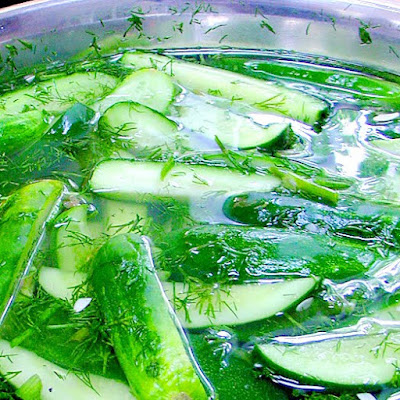Pickles Pt. 2: Brined Fermented Pickles
Anyone for brined fermented pickles? Sounds dreadful, but this is the superior pickle form. When pickles are allowed to sit in salty water for anywhere between a week to a few months a snappy and tart pickle emerges. I wrote this in the previous pickle entry: osmosis draws out the liquids, hardens pectins, and keeps the vegetable crunchy. Lactic acids develop and increases the acidity, preserving the pickles and making them tangy. These are the kind of pickles you find in delis or in giant barrels. They can be further preserved by canning. Canning processes cooks the cucumber, leaving it weaker and aged. Fresh pickles are strong, healthy, raw, and almost still alive. As long as they are covered in their salty fluids and kept cool these pickles will be okay for a long time.
The biggest trick is to get the brine right, it can make a pickle way to salty or bitter. Its possible to preserve your pickles in really salty solution, and then to de-salinate them by soaking in fresh water later. I suggest using the recipe below. I'm quite fond of this wild fermentation website at the moment, and will be posting my sauerkraut soon.
To see the sour cucumber pickle recipe visit: Wild Fermentation's website
The biggest trick is to get the brine right, it can make a pickle way to salty or bitter. Its possible to preserve your pickles in really salty solution, and then to de-salinate them by soaking in fresh water later. I suggest using the recipe below. I'm quite fond of this wild fermentation website at the moment, and will be posting my sauerkraut soon.
To see the sour cucumber pickle recipe visit: Wild Fermentation's website




Comments
Post a Comment